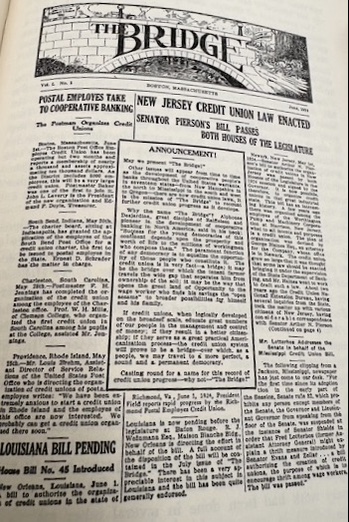This week I explore the integral role credit unions expected to play supporting democracy in America. Yesterday’s post presented ten principles of cooperative action during WW II when democracies united to fight fascist dictatorships.
Today I describe how this role is framed in the first credit union publication, The Bridge.
In the Beginning
The first national credit union journal appeared in June 1924. Called The Bridge, the lead articles included: Postal Employees Take to Cooperative Banking and New Jersey Credit Union Law Enacted.
But most importantly in this initial edition was the Announcement box centered on the front page. This column gave the rationale for The Bridge’s name. It was a metaphor referring to credit union’s fundamental purpose to promote democracy.
Below is a copy of that front page. After the photo is a retyped, clearer version, of this statement of credit union’s role in America’s democratic development.
The Paramount Function
Announcement!
May we present “The Bridge!”
Other issues will appear from time to time as the development of cooperative people’s banks throughout the United States warrants. In seventeen states—from New Hampshire in the north to Mississippi in the south and west to Oregon—there are now credit union laws. It is the mission of the “The Bridge” to recount further credit union progress as it develops period.
Why the name “The Bridge”? Alphonse Desjardins, great disciple of Raiffeisen and pioneer in the development of cooperative banking in North America, said in his book: “Success for the young democracies of this continent depends upon the prosperity and worth of life to the millions of working men who compose them.”
The paramount function of any democracy is to equalize the opportunity of those people who constitute it. The credit union is in very fact—a bridge; it may be the bridge over which the tenant farmer travels the wide gap that separates him from ownership of the soil; it may be the way that opens the great land of Opportunity to the wage worker who finds his savings the “open sesame” to broader possibilities for himself and his family.
If credit unions, when logically developed on the broadest scale, educate great numbers of our people in the management and control of money; if they result in a better citizenship; if they serve as a great practical Americanization process—the credit union system will prove to be a bridge—over which, as a people, we may travel to a more perfect, a sound and a permanent democracy.
Casting around for a name for this record of credit union progress–why not—“The Bridge”
June 1924, Vol. L No. 1

